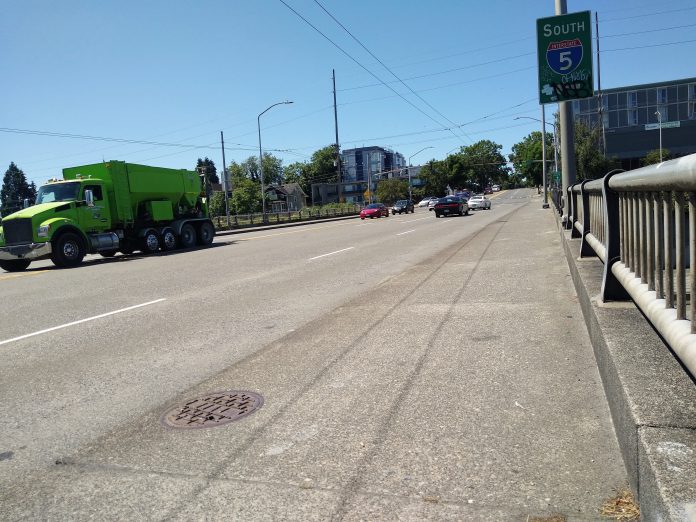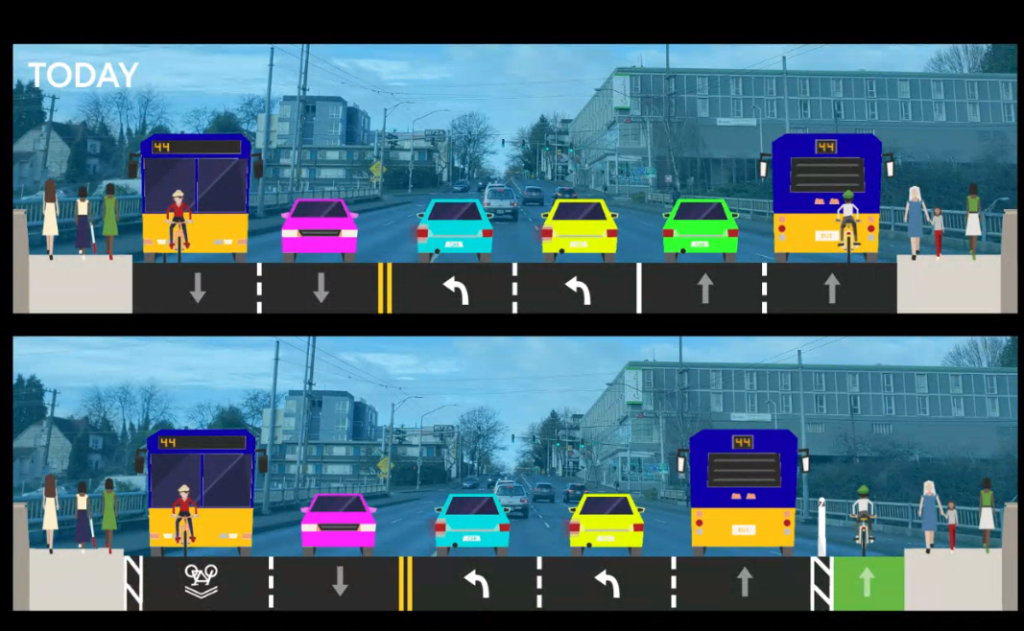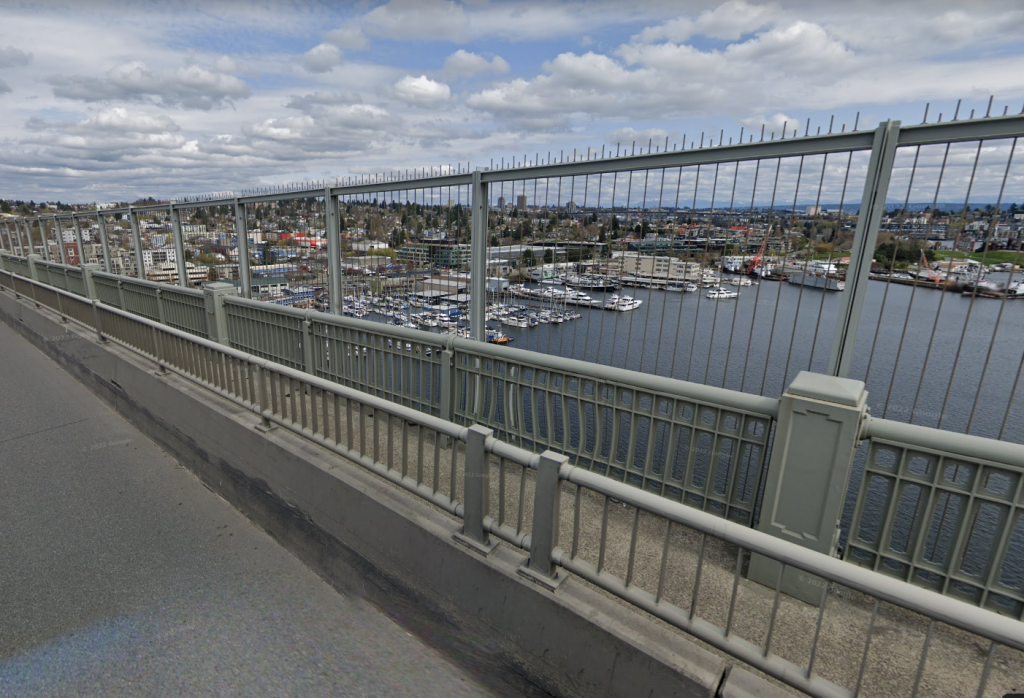
Just over $1.5 million dollars of expected transportation revenue was not collected by the Washington Department of Licensing in 2023 due to an “administrative error” at the City of Seattle, the Seattle Department of Transportation (SDOT) revealed last week. The Seattle City Council approved a $10 increase to the city’s Vehicle License Fee, or car tab, late last year, and it was scheduled to take effect mid-year, but since the state was not notified, vehicle owners will likely not start paying the additional amount until late this year at the earliest.
The news comes on top of another funding shortfall set to have a significant impact on pedestrian safety projects, caused by staffing issues at the Seattle Police Department (SPD). Without sworn police officers reviewing citations, hundreds of thousands of automatic traffic tickets expired before they could be issued in 2021 and 2022. As a result, $3.5 million in cuts are being made to SDOT’s budget in 2024, largely to the program that adds ADA curb ramps to city streets.
Previously SPD had been the cause in about $5 million in lost parking revenue after neglecting to complete the paperwork to transfer parking enforcement authority after the city council briefly relocated parking enforcement to SDOT, forcing the City to vacate or refund more than 200,000 parking fines.
In 2023, almost all of the funds from the increase to the Vehicle License Fee had been earmarked for improvements to the NE 45th Street overpass between Wallingford and the University District, thanks to a budget amendment by District 4 Councilmember Alex Pedersen. Pedersen, who spearheaded the proposal to increase the fee in the first place, has been pushing for the project to happen after substantial upgrades to the bridge were dropped from the Route 44 Transit-Plus Multimodal Corridor project, which SDOT wrapped up this spring.
“Because these revenues do not exist, SDOT is in the position of removing the funding from our 2023 budget,” SDOT spokesperson Mariam Ali told The Urbanist. “Working with the City Budget Office, SDOT submitted the corresponding budget change in the 2023 year-end supplemental legislation that is currently before the City Council for review. As a result, the bridge project is paused and will not proceed until there are revenues and budget to support the work.”
Originally scoped to include a protected bike lane that would provide a safe way for people on the west side of I-5 to access Sound Transit’s U District light rail station, the NE 45th Street overpass project was scaled back after the Washington State Department of Transportation (WSDOT) raised “operational concerns.” Due to fears that traffic would back up onto I-5 and also delay buses on the corridor, the agencies declined to reallocate street space on the bridge — instead, railings are set to be added between the sidewalk and vehicle lanes on one side, and the sidewalk and I-5 on the other.

Instead of creating dedicated space to bike across I-5 at 45th Street, SDOT shifted to making it safer to bike on the existing sidewalk, with railings on both sides similar to the Aurora Bridge pedestrian path. The total estimated cost for these upgrades is $1.5 million — nearly the exact amount that SDOT is set to be short due to the error in question.

While the funding shortfall impacts SDOT’s budget, the administrative error that prompted it occurred outside the department. The Office of the City Clerk is in charge of communicating changes like a $10 increase in the city’s vehicle license fee, Ali said, but it was Seattle’s City Budget Office that noticed that this wasn’t getting collected, just a few weeks ago in late August. After the oversight was discovered and the state notified, the City says it expects revenue to start coming in by the end of the year. For a full year, the increased car tab is expected to bring in an additional $4 million dollars.
Councilmember Pedersen, who serves as transportation committee chair, contends that even though the dedicated revenue source for the upgrades to NE 45th Street was impacted, SDOT should be able to find the funds elsewhere in its budget, including the significant amount of money that is being “carried forward” from 2023 to 2024’s budget that wasn’t able to be spent. Bringing funds forward from one year to the next has become a trend over the life of the Move Seattle levy, as the department has had to scale up its capacity to deliver on its promises over time.
“It was disheartening to hear that an administrative oversight means the $10 increase in the Vehicle License Fee will go into effect in December instead of July, but — considering the millions of dollars SDOT plans to carry forward into next year — this should not have delayed any capital projects,” Pedersen said. “For the NE 45th Street project linking Wallingford to the U District urban center with a new light rail station, it’s important to add that SDOT chose on its own to pause the overpass portion earlier, as it pursued a State grant that it ultimately didn’t receive.”
In 2024, funds from the $10 car tab were originally set to be split between additional Vision Zero projects and bridge maintenance projects, but at this point, it’s not clear what exactly those funds will be used for. It’s likely that councilmembers, especially Pedersen, will want to provide more explicit direction as part of this year’s budget, rather than leave that discretion up to SDOT entirely.
“There is unity at City Hall to do more to achieve safer streets,” Pedersen said. “My legislative colleagues and I have provided the authority and appropriated the money for street improvement projects and for expanding automated traffic enforcement cameras, so we rely on the executive departments of our city government to get the job done so that fewer people are harmed by vehicles.”
Ryan Packer has been writing for The Urbanist since 2015, and currently reports full-time as Contributing Editor. Their beats are transportation, land use, public space, traffic safety, and obscure community meetings. Packer has also reported for other regional outlets including BikePortland, Seattle Met, and PubliCola. They live in the Capitol Hill neighborhood of Seattle.

